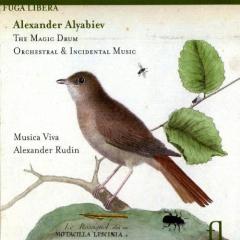Alyabiev - The Magic Drum, Orchestral & Incidental Music (2013)
Alyabiev - The Magic Drum, Orchestral & Incidental Music (2013)

1 Overture to the vaudeville: Tri desyatki, ili Novoe dvuhdnevnoe prikljuchenie 10:08 2 Symphony No. 3 for 4 Horns in E Minor 8:26 3 Overture to the vaudeville: Melodaya mat' i zhenih v 48 let, ili Domashnij spektakl' 5:52 4 Overture to the drama Otstupnik: ili Osada Korinfa 5:13 5 Variations on the Ukrainian theme Ehal kazak za Dunai 11:39 6 Burya 2:34 7 Overture to the vaudeville: Utro i vecher, ili Veter peremenilsy 5:38 8 Volshebniy baraban, ili Sledstviye Volshebnoy fleyti: Scene 4 1:29 9 Volshebniy baraban, ili Sledstviye Volshebnoy fleyti: Scene 5 1:54 10 Volshebniy baraban, ili Sledstviye Volshebnoy fleyti: Scene 5 - Finale 1:24 11 Volshebniy baraban, ili Sledstviye Volshebnoy fleyti: Scene 6 1:23 12 Volshebniy baraban, ili Sledstviye Volshebnoy fleyti: Overture 6:09 Jury Grevtsev - Horn Alexei Kropotov - Cello Alexey Melnikov - Horn Alexander Trostiansky - Violin Sergey Vaskovich - Horn Musica Viva Chamber Orchestra Alexander Rudin - Conductor
For many reasons, history accords Mikhail Glinka with the distinction as the composer from whom the Russian school of composition first springs, not the least being that the so-called "Mighty Handful" -- Mussorgsky, Rimsky-Korsakov, Borodin -- readily acknowledged Glinka in this respect. However, the "Five" were not the only important composers active in Russia in the nineteenth century -- there was, after all, Tchaikovsky -- and conversely, Glinka was not necessarily the earliest composer of orchestral music whose work we can distinctively recognize as being Russian. That milestone should certainly at least be shared with Glinka's slightly older contemporary Alexander Alyabyev, born in 1787 and known for a single song, "The Nightingale," penned as he waited out a prison term on a trumped-up murder charge. Both Glinka and Liszt based elaborate sets of variations on this simple tune, and Tchaikovsky himself borrowed another Alyabyev melody for one of the duets in his opera Eugene Onegin. Belgian label Fuga Libera helps redress this historical oversight through its fine disc Alexander Alyabiev: The Magic Drum -- Orchestral and Instrumental Music, which features the Russian ensemble Musica Viva under Alexander Rudin.
The disc contains the overture and several cues from Alyabyev's two-act ballet The Magic Drum, or a Sequel to The Magic Flute (1827); plus several overtures to vaudeville shows written for performance in prison, bearing bizarre titles such as The Young Mother and the 48-Year Old Fiancé (1825-1828). From another show comes a brief and appropriately stormy "symphonic picture" on Shakespeare's The Tempest (1827), whereas the remaining works are stand-alone instrumental pieces; a set of Variations on the Ukrainian Theme "The Cossack on the Danube" for violin and orchestra (before 1820) and the Symphony No. 3 in E minor for four horns and orchestra (1815). The last named works were early "hits" for Alyabyev and date from the time when he was a young, wealthy, and highborn cavalry officer and amateur composer. After the aforementioned scandal broke, Alyabyev was forced to pay his debt to society for the rest of his life, even though he was pardoned in 1838; after a certain point, Alyabyev composed, as there was little else left for him in life.
In the early symphony for four horns, it is easy to detect the influence of Beethoven, and for an amateur Russian in 1815, Alyabyev was surprisingly up to speed on current trends. In subsequent works, it is easy to hear indications of where Glinka got certain ideas of orchestral treatment, and from The Magic Drum, the same for Tchaikovsky. However, Alyabyev always has one foot in the eighteenth century; again, in The Magic Drum, one swiftly turns the corner from harmoniemusik in the vein of a Mozart serenade to a passage that sounds like something out of Swan Lake. If any of these scores have been recorded before, they have not been available in the West, and indeed, much of this music still appears to be in manuscript. Musica Viva's performances are dedicated, lively, spirited, and polished, and the recording quality is terrific. Fuga Libera's Alexander Alyabiev: The Magic Drum -- Orchestral and Instrumental Music fills in an essential -- and heretofore, missing -- piece of the puzzle regarding nineteenth century Russian orchestral music. Those who love Tchaikovsky's ballet music will be floored by Alyabyev's anticipation of it nearly 20 years before Tchaikovsky was born. ---Uncle Dave Lewis, AllMusic Review
download (mp3 @320 kbs):








